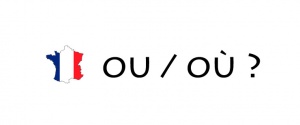Difference between revisions of "Language/French/Grammar/When-use-ou-or-où"
m (Quick edit) |
m (Quick edit) |
||
| Line 1: | Line 1: | ||
{{French-or}} | {{French-or}} | ||
<div class="pg_page_title">How to know when to use "où" and "ou"?</div> | <div class="pg_page_title">How to know when to use "où" and "ou"?</div> | ||
[[File:ou-où.jpg|thumb]] | [[File:ou-où.jpg|thumb]] | ||
How to use | How to properly use the French prepositions "ou" and "où"? Those 2 distinct conjunctions in French are used to convey various meanings, and it's essential to understand the difference between these two words. After mastering this lesson, you might also be interested in exploring other aspects of French grammar, such as [[Language/French/Grammar/How-to-use-«-il-y-a-»-in-French|using « il y a » in French]], [[Language/French/Grammar/Possessive-determiners|learning about possessive determiners]], and [[Language/French/Grammar/The-plural-of-compound-nouns|understanding the plural of compound nouns]]. Dive into this lesson and enhance your French language skills! 🇫🇷 | ||
Those 2 distinct conjunctions in French are used to convey various meanings and | |||
==Summary== | ==Summary== | ||
It's easy! :) | It's easy! :) | ||
| Line 46: | Line 44: | ||
<youtube>https://www.youtube.com/watch?v=BSkPkALZxjw</youtube> | <youtube>https://www.youtube.com/watch?v=BSkPkALZxjw</youtube> | ||
== | ==Other Lessons== | ||
* [[Language/French/Grammar/Comparatives-and-Superlatives|Comparatives and Superlatives]] | * [[Language/French/Grammar/Comparatives-and-Superlatives|Comparatives and Superlatives]] | ||
* [[Language/French/Grammar/Negations|Negations]] | * [[Language/French/Grammar/Negations|Negations]] | ||
| Line 57: | Line 55: | ||
* [[Language/French/Grammar/Imperative-mood|Imperative mood]] | * [[Language/French/Grammar/Imperative-mood|Imperative mood]] | ||
* [[Language/French/Grammar/Gender-of-Nouns-Names-of-ships-and-restaurants|Gender of Nouns Names of ships and restaurants]] | * [[Language/French/Grammar/Gender-of-Nouns-Names-of-ships-and-restaurants|Gender of Nouns Names of ships and restaurants]] | ||
<span links></span> | |||
Latest revision as of 22:33, 24 March 2023
| When use: Quand or Quant? | Ou or Où? | a or à? |
How to properly use the French prepositions "ou" and "où"? Those 2 distinct conjunctions in French are used to convey various meanings, and it's essential to understand the difference between these two words. After mastering this lesson, you might also be interested in exploring other aspects of French grammar, such as using « il y a » in French, learning about possessive determiners, and understanding the plural of compound nouns. Dive into this lesson and enhance your French language skills! 🇫🇷
Summary[edit | edit source]
It's easy! :)
- OU = OR
- OÙ = WHERE
NB: "OU" and "OÙ" have exactly the same pronunciation.
ou[edit | edit source]
"Ou" is a conjunction that is used to connect two or more alternatives. It is equivalent to the English word "or". It expresses a choice between one or more things and is used in an affirmative sentence.
It can be replaced by "ou bien" (or, else).
- Example: Je veux du fromage ou rien du tout. (I want some cheese or nothing) ➡ Je veux du fromage ou bien rien du tout (I want some cheese, or else, nothing).
- Je veux prendre un café ou un thé. (I want to have a coffee or a tea).
où[edit | edit source]
"Où" is an interrogative adverb, or subordinating relative pronoun that is used to ask a question about a location or to express a place. It is equivalent to the English word "where".
It's an interrogative adverb in
- direct interrogative sentence: « Où allons-nous ? (Where are we going?)
- or Indirect « Je te demande où nous allons » (I ask you where we're going).
You can not replace by "ou bien".
Video[edit | edit source]
In conclusion, the difference between "ou" and "où" is an important aspect of French grammar that must be understood to communicate effectively in the language. Remember to use "ou" when connecting alternatives and "où" when asking a question about a location or expressing a place.
I hope this lesson has been helpful in clarifying the use of "ou" and "où" in French grammar. Keep practicing and you will master this important aspect of the language in no time!
Videos[edit | edit source]
When to Use "Tu" and "Vous" in French - YouTube[edit | edit source]
Other Lessons[edit | edit source]
- Comparatives and Superlatives
- Negations
- Adjectives which regularly occur before and after the noun, but with a change of meaning
- Adjectives used as nouns
- How to Use Be
- Pronominal verbs, the auxiliary “être” and the agreement of the past participle
- Impersonal vs Personal
- Easy way of generating the present subjunctive
- Imperative mood
- Gender of Nouns Names of ships and restaurants
